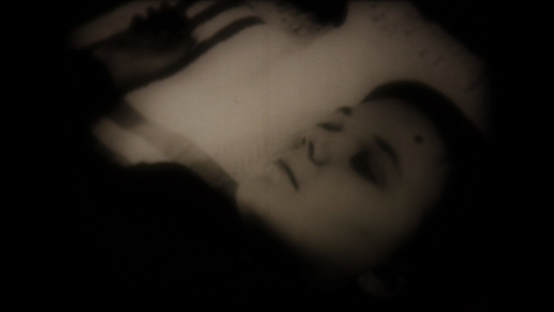|
This is the stage where art no longer beautifies or spiritualizes Nature but competes with it: the world is lost, the world itself "turns to film," any film at all, and this is what television amounts to, the world turning to any film at all, and, as you say here, "nothing happening to human beings any more,but everything happening only to images." One might also say that bodies in Nature or people in a landscape are replaced by brains in a city: the screen's no longer a window or door (behind which . . . ) nor a frame orsurface (in which . . . ) but a computer screen on which images as "data" slip around. How, though, can we still talk of art, if the world itself is turning cinematic, becoming 'just an act" directly controlled and immediately-processed by a television that excludes any supplementary function? Cinema ought to stop "being cinematic," stop play acting, and set up specificrelationships with video, with electronic and digital images, in order to develop a new form of resistance and combat the televisual function of surveillance and control. It's not a question of short-circuiting television-how could that be possible?-but of preventing television subverting or short-circuiting the extension of cinema into the new types of image. For, as you show, "since television has scorned, marginalized, repressed the potential of video-its only chance of taking over from the postwar modern cinema . . . taking over its urge to take images apart and put them back together, its break with theater, its new way of seeing the human body, bathed in images and soundsone has to hope the development of video art will itself threaten TV. " Here we see in outline the new art of City and Brain, of competing with Nature. And one can already see in this mannerism many different directions or paths, some blocked, others leading tentatively forward, offering great hopes. A mannerism of video "previsualization" in Coppola, where images are already assembled without a camera. And then a completely different mannerism, with its strict, indeed austere, method in Syberberg, where puppetry and front-projection produce an image unfolding against a background of images. Is this the same world we see in pop videos, special effects, and footage from space?Maybe pop video, up to the point where it lost its dreamlike quality, might have played some part in the pursuit of "new associations" proposed by Syberberg, might have traced out the new cerebral circuits of a cinema of the future, if it hadn't immediately been taken over by marketing jingles, sterile patterns of mentaldeficiency, intricately controlled epileptic fits (rather as, in the previous period cinema was taken over by the "then hysterical spectacle" of large-scale propaganda . . . ). And maybe space footage might also have played a part in aesthetic and noetic creation, if it had managed to produce some last reason for traveling, as Burroughs suggested, if it had managed to break free from the control of a "regular guy on the Moon who didn't forget to bring along his prayer book," and better understood the endlessly rich example of La Region Centrale, where Michael Snow devises a very austere way of making one image turn on another, and untamed nature on art, pushing cinema to the limit of a pure Spatium. And how can we tell where the experimentation with images, sounds, and music that's just beginning in the work of Resnais, Godard, the Straubs, and Duras will lead? And what new Comedyll will emerge from the mannerism of bodily postures? Your concept of mannerism is particularly convincing, once one understands how far all the various mannerisms are different, heterogeneous, above all how no common measure can be applied to them, the term indicating only a battlefield where art and thought launch together with cinema into a new domain, while the forces of control try to steal this domain from them, to take it over before they do, and set up a new clinic for social engineering. Mannerism is, in all these conflicting ways, the convulsive confrontation of cinema and television, where hope mingles with the worst of all possibilities. excerpt from the book: Negotiations by Gilles Deleuze
0 Comments
|
|

 RSS Feed
RSS Feed
